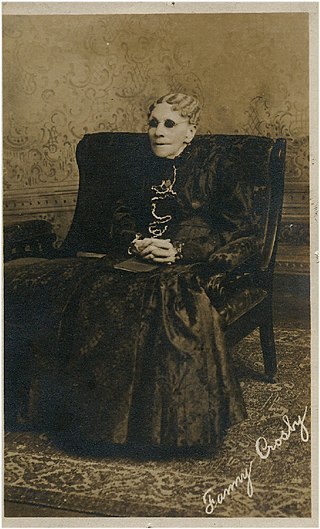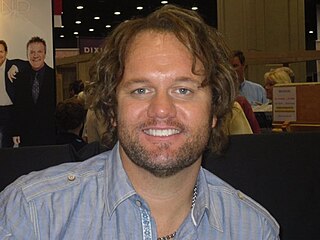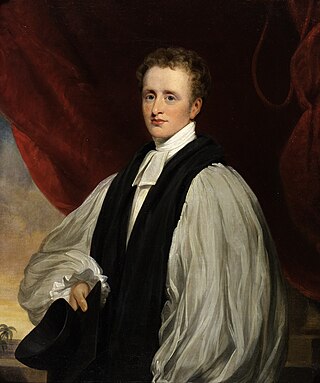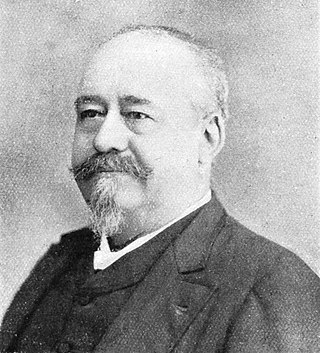This article is about music-related events in 1875.

Frances Jane van Alstyne, more commonly known as Fanny J. Crosby, was an American mission worker, poet, lyricist, and composer. She was a prolific hymnist, writing more than 8,000 hymns and gospel songs, with more than 100 million copies printed. She is also known for her teaching and her rescue mission work. By the end of the 19th century, she was a household name.

Phoebe Knapp was an American composer of music for hymns and an organist.

"How Can I Keep From Singing?" is an American folksong originally composed as a Christian hymn tune by American Baptist minister Robert Lowry. The song is frequently, though erroneously, cited as a traditional Quaker or Shaker hymn. The original composition has now entered into the public domain, and appears in several hymnals and song collections, both in its original form and with a revised text that omits most of the explicitly Christian content and adds a verse about solidarity in the face of oppression. Though it was not originally a Quaker hymn, Quakers adopted it as their own in the twentieth century and use it widely today.
Kingdom songs are the hymns sung by Jehovah's Witnesses at their religious meetings. Since 1879, the Watch Tower Society has published hymnal lyrics; by the 1920s they had published hundreds of adapted and original songs, and by the 1930s they referred to these as "Kingdom songs" in reference to God's Kingdom.

"Blessed Assurance" is a well-known Christian hymn. The lyrics were written in 1873 by blind hymn writer Fanny Crosby to the music written in 1873 by Phoebe Knapp.

Robert Lowry was an American preacher who became a popular writer of gospel music in the mid- to late-19th century. His best-known hymns include "Shall We Gather at the River", "Christ Arose!", "How Can I Keep from Singing?" and "Nothing But The Blood Of Jesus".
Hymns are an important part of the history and worship of the Church of Jesus Christ of Latter-day Saints.

David Norris Phelps is an American Christian music vocalist, songwriter and vocal arranger, who is best known for singing tenor in the Gaither Vocal Band. He has also released several solo albums, including four Christmas collections. On January 13, 2008, Phelps appeared on Extreme Makeover Home Edition for the Woodhouse family.
"You Took Advantage of Me" is a 1928 popular song composed by Richard Rodgers, with lyrics by Lorenz Hart, for the musical Present Arms (1928), where it was introduced by Joyce Barbour and Busby Berkeley as the characters Edna Stevens and Douglas Atwell. The characters were formerly married, but still have romantic feelings for each other. On opening night, Berkeley forgot the lyrics and had to scat and hum the entire second verse. Berkeley also claimed that his nonsense lyrics for the improvised second verse left Hart "almost apoplectic", but the audience was amused and Hart later forgave him. The song was subsequently included in the 1930 film Leathernecking, an adaptation of Present Arms.

To God Be the Glory is a hymn with lyrics by Fanny Crosby and tune by William Howard Doane, first published in 1875.

"Pass Me Not, O Gentle Savior" is a 19th-century American hymn written by Fanny Crosby in 1868, set to music by William H. Doane in 1870.
"Have Thine Own Way, Lord" is a Christian hymn with lyrics by Adelaide A. Pollard and music by George C. Stebbins. It was first published in 1907 in the "Northfield Hymnal with Alexander's Supplement". Later that year, it also appeared in two other popular hymnals, Ira Sankey's "Hallowed Hymns New and Old" and Sankey and Clement's "Best Endeavor Hymns".

"Follow On", also known in certain cases as "Down In The Valley With My Saviour I Would Go" and "I Will Follow Jesus", is a Christian hymn written in 1878 by William Orcutt Cushing. The music for it was composed in 1880 by both Robert Lowry and W. Howard Doane.

"Brightest and Best" is a Christian hymn written in 1811 by the Anglican bishop Reginald Heber to be sung at the feast of Epiphany. It appeared in Heber's widow's compilation of hymns entitled Hymns Written and Adapted to the Weekly Service of the Church Year in 1827. It can be sung to a number of tunes, including "Liebster Immanuel", "Morning Star" by James P. Harding, "Epiphany" by Joseph Thrupp, and "Star in the East" by William Walker. It appears in many hymnals across different Christian traditions. It has been recorded by a number of artists, including Glen Campbell, Joanne Hogg and Kathy Mattea. The Kentucky traditional singer Jean Ritchie often sang this and told of her childhood memory of her grandmother sitting by the fire and singing it quietly to herself on Twelfth Night; the Library of Congress collected it from her in 1951.
Jane Laurie Borthwick was hymn writer, translator of German hymns and a noble supporter of home and foreign missions. She published under the pseudonym: H. L. L.. Jane Laurie Borthwick is best known for the Hymns from the Land of Luther; her most famous translation today is Be still, my soul and her most known original text is Come, labor on. Like Catherine Winkworth and Frances Elizabeth Cox, she greatly contributed to English-language hymnody by mediating German hymnody.

John Robson Sweney was an American composer from Pennsylvania. He was a professor of music at the Pennsylvania Military Academy for twenty-five years and collaborated with William J. Kirkpatrick to produce and publish over 1,000 gospel hymn songs and over sixty hymnal books. His most popular and widely known hymn is "Beulah Land".

"Macht hoch die Tür" is a German popular Advent hymn, written in Ducal Prussia in the 17th century. The lyrics were written by Georg Weissel in 1623, for the inauguration of the Altroßgärter Kirche in Königsberg. The melody that is now associated with the text appeared first in 1704 in the hymnal by Johann Anastasius Freylinghausen.










